Marketing technology, or martech, is an essential element of a CMO or marketer’s toolkit. In fact, 68% of CMOs believe that martech is a crucial part of their marketing strategy and helps them meet customer expectations.
It is also one of the fastest-growing industries. The industry was valued at USD 325.7 billion in 2022 and is expected to grow at a CAGR of 19.8%. To capitalize on this growth, new marketing technology startups enter the market every year. In this article, I have compiled a list of emerging and fast-growing martech startups that you should look for if you are a marketer or a business owner.
What Is MarTech?
MarTech refers to the tools or software marketers use to plan, execute, and analyze marketing campaigns. It encompasses a wide range of technologies, including analytics, automation, email marketing software, and so on. Martech aims to streamline marketing processes, enhance efficiency, and provide data-driven insights to improve overall marketing strategies.
Examples of Different Types of MarTech:
Here are some popular categories of marketing software that you might expect to see in any MarTech stack.
- Marketing Planning Software
- Marketing Collaboration Software
- Marketing Intelligence Software
- Brand Management Software
- Account-Based Marketing Software
- Social Media Management Software
- Email Marketing Software
- Content Marketing Software
- PR Platforms
- SEO Tools
If you need a deep dive into what is marketing software and more, we've got you covered.
Top 15 Emerging MarTech Startups
Let’s look at each of the 15 emerging martech startups and what each offers.
1. Wavve
Founded: 2019

Wavve lets users create audiograms for platforms like YouTube and Instagram.
Who they are: Wavve is a technology company that helps users convert audio into engaging video clips that they can use for social media promotion. It is commonly used by podcasters, musicians, and other content creators to share their audio content on visual-centric platforms like Instagram, Twitter, and Facebook. Marketers can use Wavve to repurpose high-performing audio content into different formats.
Software Key Features: The key features of Wavve include audiogram creation, video waveform editing, intuitive audio processing tools, customizable captions and subtitles, advanced audio analytics, and cross-platform sharing capabilities.
2. Prowly
Founded: 2020
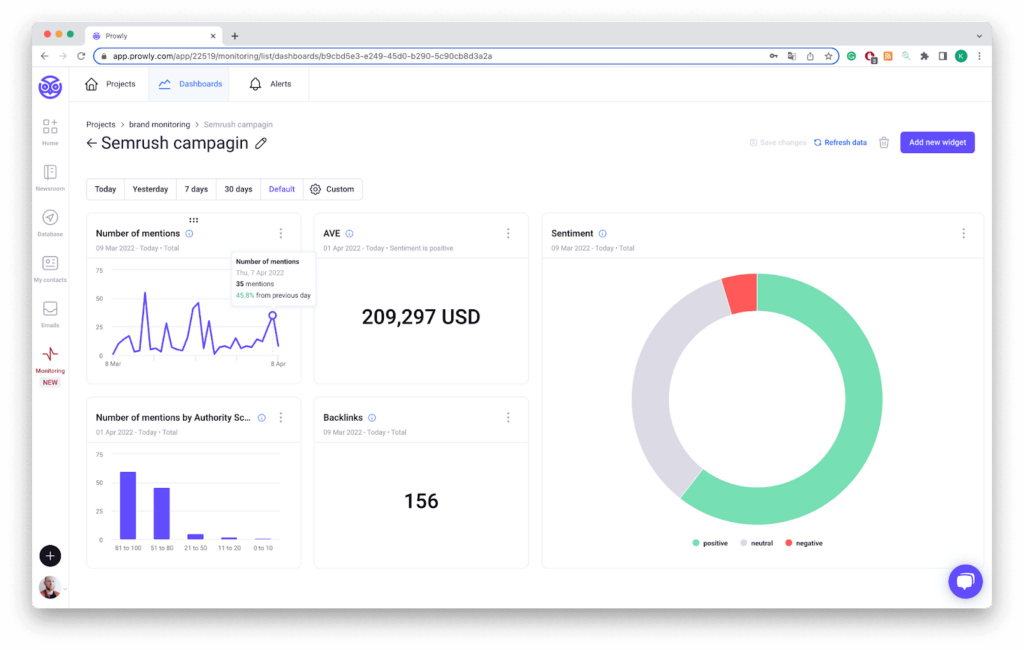
Prowly’s media monitoring feature helps users track online brand mentions, set up email notifications, and analyze PR performance.
Who they are: Prowly is a company that specializes in providing public relations (PR) software designed to manage communication and media relations processes. Prowly offers an all-in-one platform that caters to the needs of PR professionals, allowing them to manage and optimize their media outreach, press releases, and brand communication strategies.
Marketers can also use Prowly to enhance their brand's visibility and reputation through effective media communication. The platform includes features such as media database management, press release distribution, and analytics tools, enabling marketing professionals to craft compelling narratives and effectively engage with journalists, influencers, and the media.
Software Key Features: Prowly’s key features include a press release creator, online newsroom, media database, media monitoring, and PR reports.
3. Postscript
Founded: 2018

Postscript allows users to set up 35 segmentation filters for creating hyper-relevant SMS campaigns.
Who they are: Postscript is an all-in-one SMS revenue platform for Shopify merchants. This platform empowers marketers to craft targeted and engaging SMS campaigns, facilitating real-time customer interactions. By leveraging Postscript's features, businesses can send personalized promotions, order updates, and other relevant information directly to consumers' mobile devices. This direct and immediate form of communication fosters brand loyalty and significantly contributes to the overall customer experience.
Postscript also offers a Cashback solution called Fondue. It helps users increase list growth, increase margins, and maximize revenue using cashback.
Software Key Features: The key features of Postscript include SMS campaigns, automations, segmentation, analytics and reporting, opt-in tools such as website pop-ups, and compliance features.
4. Movable Ink
Founded: 2010

The analytics feature of Movable Ink enables marketers to get insights about email performance and customer engagement.
Who they are: Headquartered in New York, Movable Ink uses AI and automation to create personalized content. Movable Ink’s clients include Nickelodeon, Clinique, Dunkin Donuts, Viacom, Under Armour, Scholastic, and more.
The platform helps marketers and business owners create dynamic images for each customer, depending on the stage of their journey. Overall, Movable Ink aims to enhance the relevance and engagement of email marketing campaigns by delivering content that is more tailored to the individual recipient at the moment of opening. This real-time personalization and adaptability aim to improve customer experience and increase the effectiveness of email marketing efforts.
Software Key Features: The standout features of Movable Ink are data activation, dynamic content, and image library.
5. Productboard
Founded: 2014
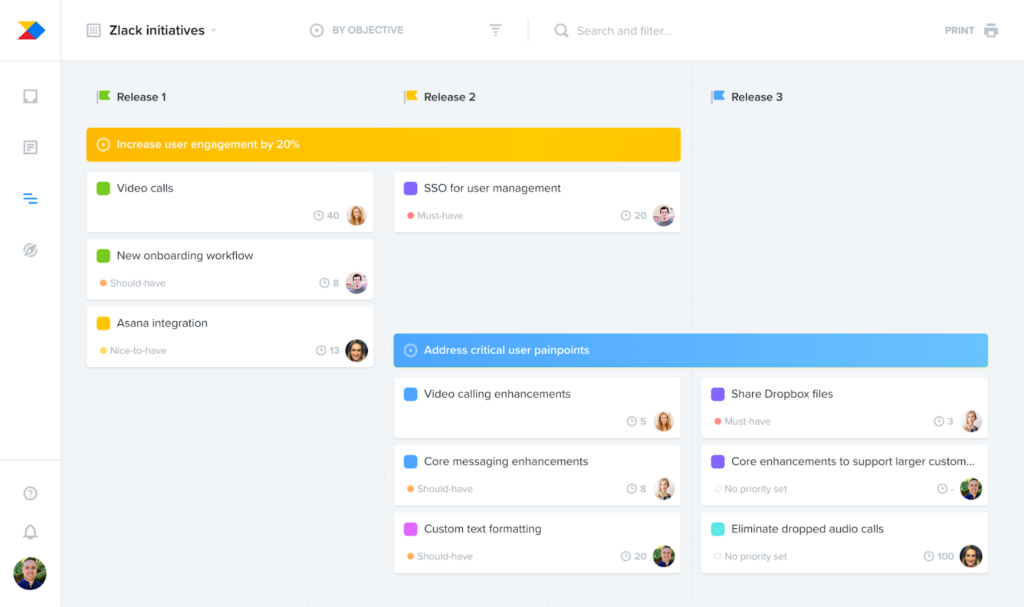
Productboard’s product roadmap feature visually represents a product’s development.
Who they are: Founded in 2014, Productboard is a tech startup on a mission to help companies make better products. Their all-in-one product management software allows businesses to launch great products. It helps companies understand what their customers need, get buy-in from stakeholders, align everyone on the product journey, consolidate customer feedback, and prioritize what to build next.
Productboard serves as a central hub where product and marketing teams can collaborate, ensuring that marketing strategies are informed by the product workflow and customer feedback. For example, marketers can tailor their campaigns to highlight upcoming features or improvements by having insights into planned product features and their priority levels. This ensures marketing messages align with the product roadmap and resonate with the target audience. Productboard also allows users to send automated notifications and custom updates to colleagues so everyone can stay in the loop regarding new features or any other progress.
Additionally, product marketing, customer support, product management, and sales teams can collaborate with the help of Productboard to track tasks and progress to ensure a successful release.
Software Key Features: The main features of Productboard include project management, product roadmaps, progress monitoring, analytics, and team collaboration.
6. Reachdesk
Founded: 2018
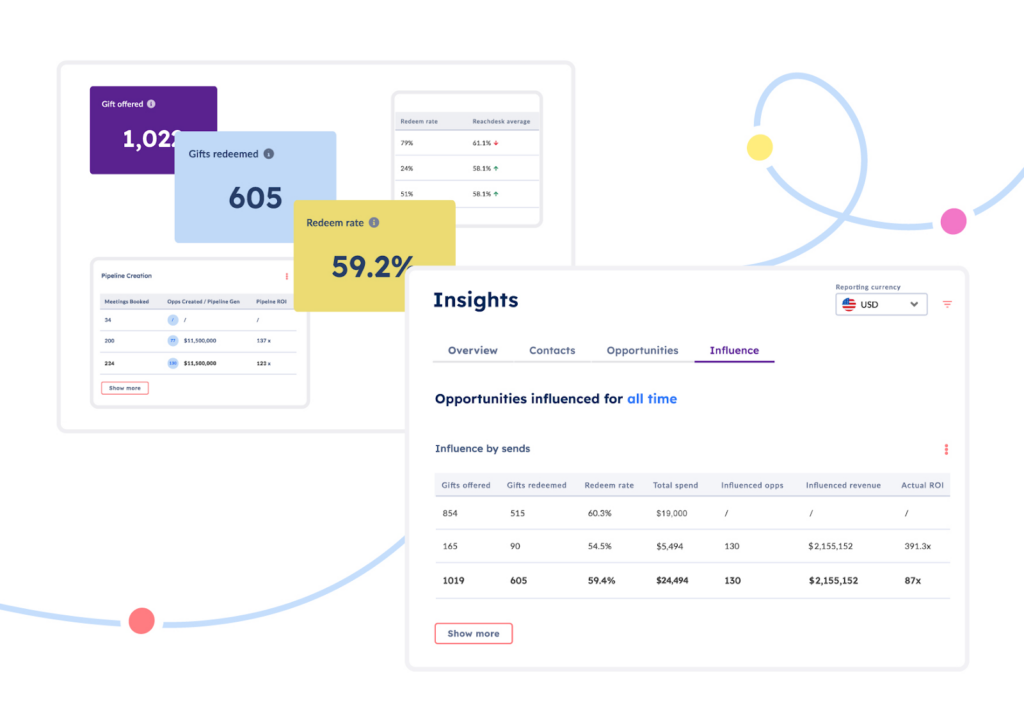
The Reachdesk Insights feature provides data-driven insights regarding the performance of your gifting campaigns.
Who they are: Reachdesk is a software company that allows users to send personalized and physical items to their target audience, such as direct mail, gifts, or branded merchandise. This can be integrated into a company's broader marketing and sales campaigns, adding a tangible and personalized touch to the engagement process. The idea is to create a more memorable and impactful experience for prospects and customers.
Additionally, Reachdesk helps users source items from local suppliers and ship to more than 165 countries. It also integrates with the users existing tech stack so that gifting becomes an integrated part of the overall marketing strategy.
Software Key Features: The key features of Reachdesk are inventory management, analytics, gift card management, and conversion tracking.
7. Raydiant
Founded: 2017

Raydiant’s in-store analytics feature helps retailers gain insights into customers’ behavior.
Who they are: Loved by companies like Chick-fil-A, Toyota, Macy’s, Red Bull, and Baskin Robbins, Raydiant is a technology company that provides innovative digital signage solutions. It allows businesses to create and display dynamic content on digital screens within physical spaces. It is particularly helpful for retail environments, hospitality, and other areas.
Raydiant also contributes to an immersive brand experience, fostering customer engagement and loyalty. For example, the platform can highlight new products in a retail setting, showcase promotions, and provide interactive elements that encourage customer interaction. Raydiant's software can be utilized in corporate environments for internal communications, event promotions, and brand reinforcement.
Software Key Features: The key features of Raydiant are automatic player updates, content scheduling, a media library, multi-screen support, remote display management, and a visual editor.
8. SOCi
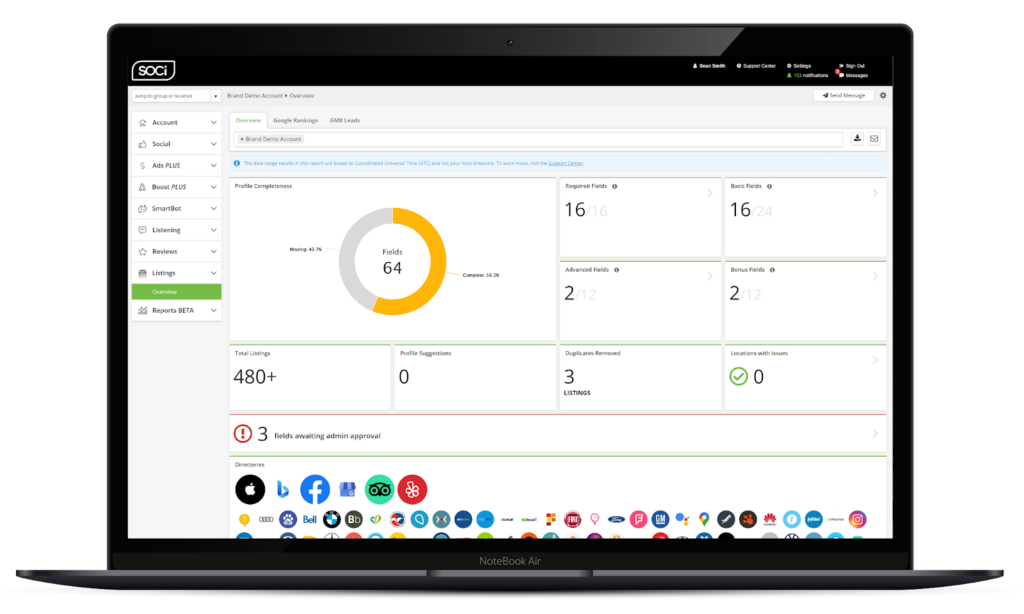
SOCi’s listing feature helps multi-location businesses manage their presence on business listings.
Who they are: Based in San Diego, SOCi is a prominent social media management tool tailored for multi-location businesses. This comprehensive platform equips companies and marketers with essential tools, encompassing content creation, publishing, scheduling, and reporting functionalities. A notable feature of SOCi is its Content Creator, a tool that evaluates and assigns scores to content circulating on the web, aiding businesses in optimizing their online presence.
SOCi extends its support to major social media platforms, including Twitter, Facebook, Instagram, LinkedIn, and Google Business, offering scheduling capabilities. Beyond basic scheduling, the platform distinguishes itself by providing a detailed performance analysis at both the account and location levels. This analytical depth empowers businesses to refine their social media strategies, facilitating the creation of more targeted and localized content for enhanced engagement and impact.
Software Key Features: The key features of SOCi are content publishing and scheduling, analytics, social listening, and collaboration.
9. Rad AI
Founded: 2018

RAD AI’s creative intelligence feature uses artificial intelligence technology to automate creative and strategic decisions.
Who they are: Founded by Jeremy Barnett in 2018, RAD AI is a martech startup that uses artificial intelligence to help businesses with content strategy and influencer marketing. It leverages artificial intelligence to automate creative decisions. For example, the platform uses 600 + API-based data connections to help users create optimal influencer persona and creative strategy.
The company also aims to remove bias and guesswork from creative campaigns by delivering unbiased creative intelligence.
Software Key Features: The main features of RAD AI are AI-informed persona profiles, creative strategy, influencer selections, and influencer performance predictions.
10. CreatorIQ
Founded: 2014

CreatorIQ provides tools to help businesses manage and communicate with creators.
Who they are: Creator IQ provides businesses with a centralized hub for managing their influencer relationships. From discovery and vetting to collaboration, measurement, and analytics, the platform empowers marketers to orchestrate and evaluate their influencer strategies. Brands can use CreatorIQ to identify the most relevant influencers for their target demographic, ensuring authentic connection with their audience.
What differentiates CreatorIQ from other influencer management tools in the market is that it uses AI to identify inauthentic influencers. It assigns every influencer an ‘Integrity Quotient’, which helps understand how authentic their audience is. It can also spot fake followers and inflated reach metrics.
Software Key Features: The key features of Creator IQ are influencer scoring and segmentation, audience analysis, campaign analytics, content approval, user-generated content (UGC) management, reporting, and influencer whitelisting.
11. Jebbit
Founded: 2011

Jebbit’s template gallery feature provides seven template types businesses can use to collect zero-party data.
Who they are: The increased frequency and severity of data breaches and cybersecurity threats have made consumers more concerned about their data. Consumers are setting up ad blockers to protect their data. As a result, marketers are realizing the importance of first-party data. In fact, 88% of marketers believe that first-party data is more important than two years ago. PepsiCo is one such brand that grew its first-party data collection by 50% by exchanging people’s email addresses for reward programs.
Jebbit is one such marketing technology company that can help you collect zero-party data and achieve data transparency. On a mission to make data collection more trustworthy, Jebbit is a quiz software that’ll allow you to acquire information from customers that they’ll share voluntarily. You can choose from its 50 pre-built templates and create engaging surveys, lead forms, quizzes, lookbooks, etc. Then, marketers can use the platform to launch their quiz on their company website, partner site, mobile app, and social media platforms.
Jebbit also provides analytics and reporting features that can be used to improve the quizzes. It integrates with 35+ apps, including popular marketing software and CRMs, such as Hubspot, Facebook, Klaviyo, etc.
Software Key Features: The standout features of Jebbit are 50 pre-built quiz templates, analytics and reporting, and integration with 35+ apps.
12. Tackle
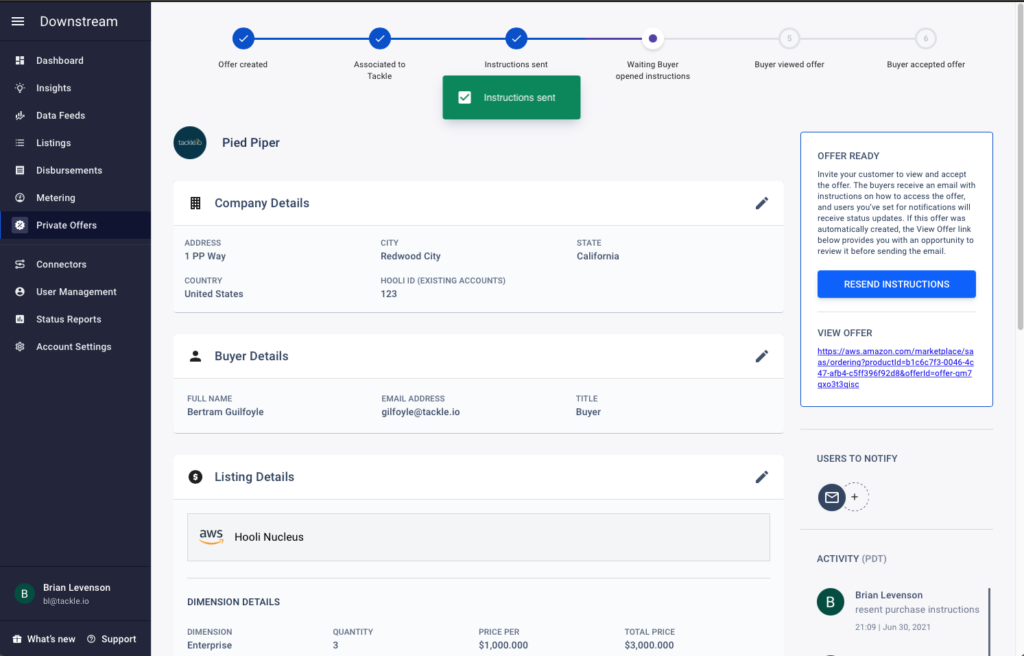
Tackle Offers shows an order’s movement through acceptance stages.
Who they are: Tackle is a cloud go-to-market (GTM) platform with over 500 software companies. The Tackle platform and their team help software companies get listed on cloud marketplaces such as AWS, Google Cloud, Microsoft, and Red Hat. They provide the data to attract buyers, scale, and automate one’s business.
Additionally, their team of industry experts and resources helps demystify pricing and packaging, post-launch marketing, and seller enablement. Even marketers and sales team members can collaborate and use Tackle to gain full visibility of the buyer journey.
Software Key Features: The standout features of Tackle are integration with cloud providers, order notifications and easy metering, developer tools, smart onboarding, and listing management.
13. Mangools
Founded: 2014
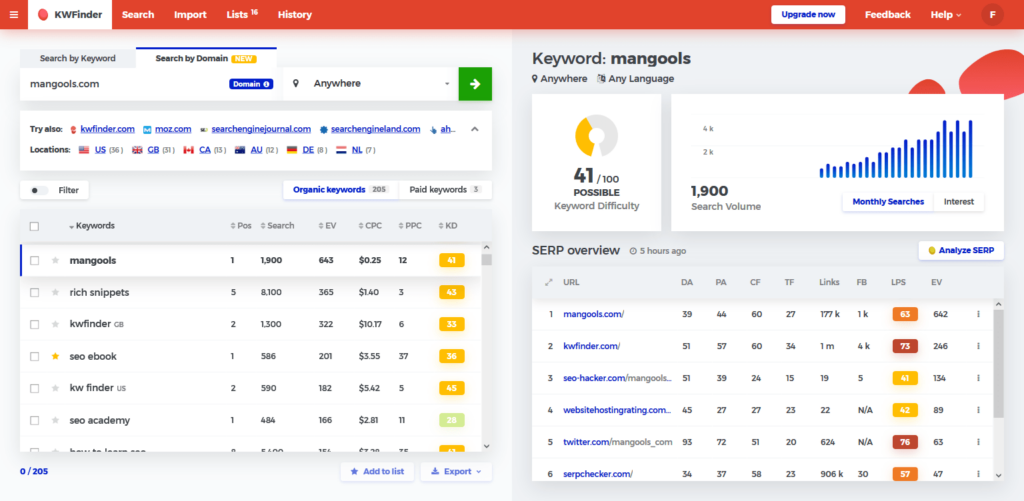
Mongool’s keyword research tool helps users find related keywords.
Who they are: Mongools is a SaaS company that offers an affordable SEO solution. Its software suite comprises five tools or apps: KWFinder, SERPChecker, SERPWatcher, LinkMiner, and SiteProfiler. It also offers three free tools, which include a free browser extension, SERP volatility checker, and SERP simulator.
Marketers can use Mongools to research keywords, analyze backlinks, and track keyword positions. Its KWFinder is a popular and straightforward keyword research tool that provides keyword suggestions. Another point to note is that its user interface is simple to use. You can quickly generate a list of keywords and sort them by different metrics.
Software Key Features: Some of the primary features of Mongools are keyword research, SERP analysis, rank tracker, backlink analysis, and competitor keyword research.
14. Flodesk
Founded: 2018
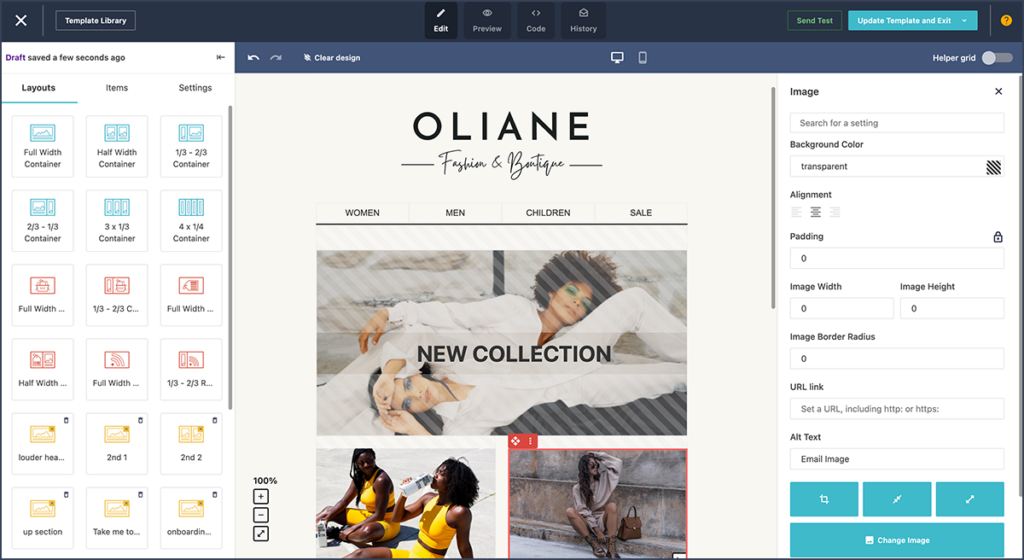
The email template builder feature of Flodesk allows users to create visually appealing and responsive emails for their marketing campaigns.
Who they are: Most email marketing software on the market is clunky and has poor UI. That’s why Martha Bitar and Rebecca Shostak founded Flodesk in 2018. Based in San Francisco, Flodesk is an email marketing platform that is designed to be user-friendly and visually appealing. Email marketers and ecommerce business owners use Flodesk to grow their email list, create beautiful sales and landing pages, create and schedule email campaigns, and make data-backed decisions with the help of analytics.
Additionally, the platform's focus on simplicity makes it an attractive option for entrepreneurs, small businesses, and creatives who may not possess extensive technical skills but seek to make a strong visual impact in their marketing endeavors.
Software Key Features: The main features of Flodesk include drag-and-drop templates, full-page forms, embedded inlines, landing pages, and popups.
15. Contentful
Founded: 2013
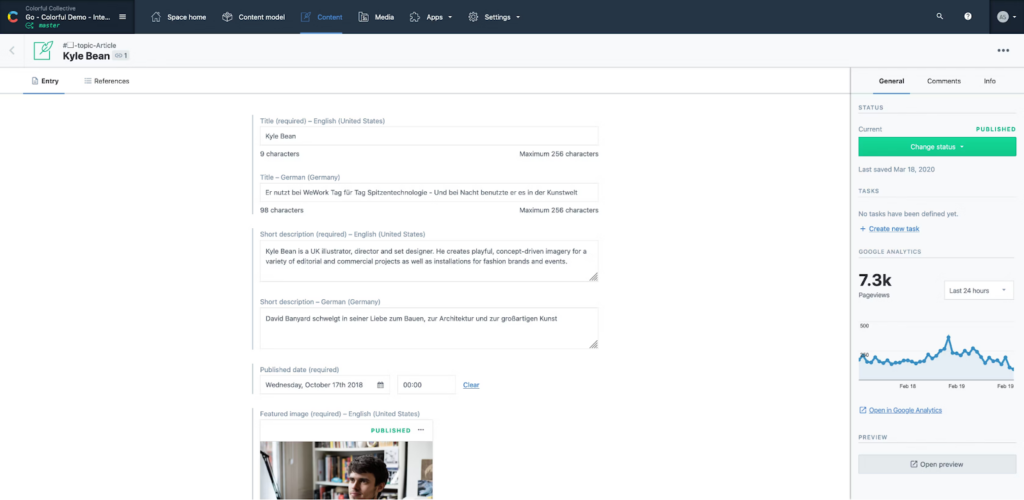
Contentful's Google Analytics integration allows users to view content performance metrics from Google Analytics directly in the sidebar of Contentful.
Who they are: If you're a content marketer who is frustrated with traditional content management systems (CMS) that lock content in silos, then you need to check Contentful. It is a headless CMS that acts as a unified hub for content. It helps non-technical users and developers create, publish, and manage content across various digital channels.
Unlike traditional CMS platforms, Contentful's headless approach decouples content creation from presentation, allowing marketers to focus on crafting compelling stories without being confined to specific templates. This flexibility is especially crucial in the ever-evolving digital marketing landscape, where trends and user preferences can change rapidly.
Software Key Features: The standout features of Contentful are content authoring, rich text editor, asset management, dashboards, and reports.
Conclusion
Like we keep tabs on the latest trends in the marketing world, it is also essential to keep an eye on emerging marketing technology startups. These startups frequently introduce disruptive solutions that can significantly enhance the efficiency, effectiveness, and overall performance of marketing efforts. These innovations may offer more cost-effective alternatives, provide unique approaches to data analysis, or leverage cutting-edge technologies such as artificial intelligence and machine learning.
To make your work easier, I curated this list of 15 emerging startups in 2025. If you’re also wondering how to build a martech stack, then you could consider the martech stack examples mentioned above. From email marketing tools to PR tools, there is so much to explore!
Additionally, if you’d like to hear more about the latest trends, tools, and news about the marketing industry, then make sure to subscribe to The CMO newsletter.


